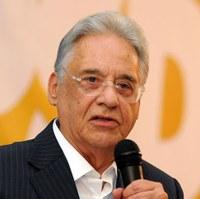Rio de Janeiro (Brazil), 1931
By Emir Sader
 Fernando Henrique Cardoso was born in Rio de Janeiro and is the son of an army general who had joined the Communist Party. At the age of eight, he moved to São Paulo, where he established himself. He studied Social Sciences at the University of São Paulo (USP) and later became a sociology professor and assistant to Florestan Fernandes. With the military coup of 1964, he was expelled from the university and went into exile in Chile and subsequently in France, where, as a professor at the Sorbonne, he witnessed the events of May ’68. He is the author of important works on Brazilian economy, politics, and society, and, along with Chilean Enzo Faletto, developed the dependency theory, consolidated in the book Dependência e desenvolvimento na América Latina (Dependency and Development in Latin America) (1969). In 1972, he published O modelo político brasileiro, in which he discusses the “authoritarian state” in the country, a theme he also addresses in Autoritarismo e democracia (Authoritarianism and Democracy) (1975).
Fernando Henrique Cardoso was born in Rio de Janeiro and is the son of an army general who had joined the Communist Party. At the age of eight, he moved to São Paulo, where he established himself. He studied Social Sciences at the University of São Paulo (USP) and later became a sociology professor and assistant to Florestan Fernandes. With the military coup of 1964, he was expelled from the university and went into exile in Chile and subsequently in France, where, as a professor at the Sorbonne, he witnessed the events of May ’68. He is the author of important works on Brazilian economy, politics, and society, and, along with Chilean Enzo Faletto, developed the dependency theory, consolidated in the book Dependência e desenvolvimento na América Latina (Dependency and Development in Latin America) (1969). In 1972, he published O modelo político brasileiro, in which he discusses the “authoritarian state” in the country, a theme he also addresses in Autoritarismo e democracia (Authoritarianism and Democracy) (1975).
He returned to Brazil in the late 1960s and founded a private research center, the Brazilian Center for Analysis and Planning (Cebrap). During this time, he joined the Brazilian Democratic Movement (MDB), an opposition party to the military dictatorship. In 1978, he was elected as a substitute senator and took office in the Senate in 1983.
As a candidate for mayor of São Paulo (1985), he was defeated by former president Jânio Quadros. In 1986, he was elected senator and was reelected in 1988. He was one of the architects of the MDB dissent that led to the founding of the Brazilian Social Democracy Party (PSDB), of which he was a founder.
During the government of Itamar Franco, after the fall of Fernando Collor de Mello, he served as Minister of Foreign Affairs and later was transferred to the Ministry of Finance. In this role, he launched the Real Plan, a neoliberal economic stabilization plan. Due to the monetary success of the plan, which curbed inflation, he was elected president of the Republic in 1994 representing a coalition between his party and the conservative Liberal Front Party, now known as DEM, defeating Luiz Inácio Lula da Silva of the Workers’ Party (PT) in the first round.
He promoted the largest privatization process the country had ever seen. The entire steel industry was handed over to private hands, as well as telecommunications and part of the electricity sector. In 1997, he broke the state monopoly on oil, keeping only 51% of the voting shares in the state company Petrobras (36% of total capital) in the nation’s hands. He repressed strikes, such as the one by oil workers in 1995, and mobilizations for agrarian reform, such as those by the MST.
In 1998, he was reelected president after getting Congress to amend the constitutional rule prohibiting reelection. However, as a consequence of his liberal economic policies, which led him to keep the value of the dollar frozen and overvalued throughout his first term, the country suffered a severe currency crisis in 1999, forcing him to significantly devalue the currency, raise interest rates astronomically (interest rates reached 49% per annum to contain capital flight), and seek a new loan from the IMF. His successor, José Serra, then Minister of Health, failed to win election and was defeated by Lula in the 2002 presidential elections. He now presides over the Fernando Henrique Cardoso Institute and is honorary president of the PSDB.
Content updated on 04/07/2017 16:35


